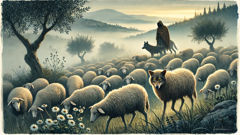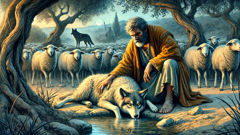Introduction
In the rolling, sun-kissed hills of ancient Greece, where wild thyme and lavender perfumed the breeze and olive trees lined the rugged paths, life was measured in the gentle rhythms of nature. The land itself seemed to pulse with the memory of gods and heroes, yet among its mortals, the stories that shaped the soul were often those whispered in the hush of dusk, as shepherds gathered their flocks and children listened with wide-eyed wonder. One such tale, passed from lips cracked by sun and wind, was that of the wolf and the sheep—a story whose lesson slipped as quietly as a shadow through the ages. Here, in a valley ringed by stoic mountains and watched over by a sleepy village, a flock of sheep grazed in peaceful oblivion, trusting in the protection of their vigilant shepherd and their unity. Yet even in this haven, unseen eyes glinted from the woodland edge, calculating and cold. The wolf, outcast and hungry, watched the sheep and their contentment with a longing sharper than hunger itself. He knew the shepherd’s watchful gaze and the dogs’ warning growls kept him at bay; every failed hunt carved new lines into his lean face. But it was not brute strength that would break the flock’s circle—it was something far subtler. As the wolf observed, he realized that the sheep’s greatest strength was also their deepest vulnerability: their trust, unwavering as the stars above. The wolf, driven by hunger and guided by cunning, resolved to become not what he was, but what they trusted most. So began the delicate weaving of his deception—a dangerous game played on the knife’s edge between survival and betrayal. In these hills, beneath skies that blushed with dawn and burned with the promise of fate, the lesson of appearances and the peril of misplaced trust would unfold, leaving footprints for every generation to ponder.
The Outcast in the Shadows
The wolf had not always lived at the periphery. In his youth, he’d been part of a pack that ranged these mountains freely, their howls echoing across the valleys at dusk. But over time, men had spread their fields and herded their flocks deeper into the wilds, fencing in the pastures and driving the wolves away. Now, alone and gaunt, he was a creature caught between worlds: too wild for the villages, too solitary for the distant packs that sometimes skirted the high peaks. He’d learned to survive on scraps—rabbits snatched from their burrows, the occasional careless hen from the fringes of a farm—but always, his gaze returned to the sheep. They grazed in such trust, their woolly backs like clouds drifting across the slopes. The shepherd, an old man named Diodoros, guarded them with patient devotion, aided by two sharp-eyed dogs. Each evening, as dusk painted the sky in bruised purples and gold, Diodoros would lead the flock home, counting each sheep as it passed into the safety of the pen. The wolf watched these rituals from his cover, noting every routine: the way the dogs circled the stragglers, the spots where the pen’s wall was weakest, the moments when Diodoros looked away. He understood that his hunger would not be sated by force; he’d lost too many battles to the shepherd’s crook and the bite of the dogs. So he waited, patient as winter.

It was on a night when the moon hung low and full, silvering the hills with its cold light, that the wolf’s opportunity arrived. A lamb had wandered from the flock, its bell lost in the underbrush. Diodoros, weary from a day’s labor, did not notice its absence until night had deepened. The wolf, silent as mist, crept close, but as he lunged, the lamb startled and bolted back toward the flock. In his frustration, the wolf stumbled across something strange: a pile of discarded wool, left after shearing. It was tangled and matted, but as he nosed through it, a daring thought took root. If he could wear the skin of his prey—become one of them—he might pass unnoticed among them. The idea was as wild as it was dangerous.
As dawn approached, he dragged the wool into the shadows and worked at his disguise with patient claws and teeth. He wrapped himself in the thick fleece, smoothing it over his own fur and fastening it with thorny stems. When he finished, he gazed at his reflection in a shallow pool. The sight was strange—a wolf’s cunning eyes beneath a mask of innocence. He moved awkwardly at first, tripping over his own paws, but soon found a rhythm. The sun rose, and with it the sheep gathered to graze. The wolf, heart pounding with both fear and anticipation, crept toward the flock, blending into their midst. The dogs sniffed at him curiously, but the overpowering scent of lanolin masked his own. Diodoros counted the sheep, his tired eyes glossing over the new arrival.
For the first time in days, the wolf felt hope flicker in his chest. He grazed alongside the sheep, careful to mimic their gentle bleats and placid movements. The flock accepted him, and even the shepherd’s dogs turned their attention elsewhere. As the sun climbed, the wolf tasted not only safety but a new kind of power—the thrill of deception. Yet he did not strike, not yet. He was patient, waiting for the perfect moment when vigilance would wane and hunger could be satisfied without risk. Among the sheep, he was invisible, a shadow clothed in wool.
As dusk approached and Diodoros began his nightly count, a storm gathered on the horizon. The air grew heavy and charged, and the sheep clustered together for comfort. The wolf felt the tension rise; his instinct screamed to run, but his mind urged caution. Lightning forked across the sky, illuminating the valley in harsh white. The sheep bleated nervously. Amidst the chaos, the wolf’s disguise held. But that night, as rain hammered the land and thunder rattled the pen, Diodoros noticed something odd: a new sheep with strange, restless eyes. He frowned but said nothing, attributing his suspicion to the tricks of age and the fatigue of a long day.
As the days passed, the wolf’s confidence grew. He learned the names the shepherd called to each sheep and mimicked their responses. He played the role of the timid newcomer, keeping to the edges yet never straying far from the flock. The other sheep welcomed him with gentle nudges, their trust as unconditional as sunlight. With each passing day, the wolf’s hunger sharpened, but so did a strange discomfort—a flicker of shame at the innocence he betrayed. He reminded himself that this was survival; yet each gentle nuzzle from a lamb or trustful glance from Diodoros chipped away at his resolve. The mask was growing heavy, and beneath it, the wolf’s heart began to ache.
The Gathering Storm
The wolf’s plan seemed flawless, his transformation nearly perfect. Day by day, he moved among the sheep, tasting what it meant to be unseen and unsuspected. With each sunrise, his anticipation grew, yet so did the peculiar weight of his disguise. Living among the flock, he witnessed their daily rituals—the way mothers watched over their lambs, how the older rams shielded the weaker ones during storms, how Diodoros hummed ancient songs as he mended fences and tended to the sick. The world of sheep was simple and warm, ruled by trust and routine. The wolf, once an outcast at the edge of survival, now existed at the heart of this gentle world, his hunger warring with an unexpected sense of belonging.

Despite his resolve, the wolf began to see the sheep not just as prey, but as individuals with quirks and kindnesses. There was Nysa, the bold ewe who led the morning charge to the freshest clover; shy Aletes, always lagging behind; and playful Melas, who skipped and tumbled down the slopes. The lambs followed him, taking comfort in his woolly disguise. At night, as they huddled close for warmth, the wolf felt the steady thump of their hearts against his side. He reminded himself that this was a charade, but the lines between mask and self began to blur.
Diodoros, too, became a figure of fascination for the wolf. The old shepherd moved slowly but missed little. He carried with him stories of gods and monsters, which he murmured to the sheep as they settled for sleep. He spoke of Prometheus, who brought fire to man, and of Aesop, whose fables taught men to see truth beneath appearances. Often, his gaze lingered on the disguised wolf, as if searching for a memory he could not grasp. The dogs circled restlessly, occasionally casting suspicious glances at the newcomer, but the scent of sheep still cloaked the wolf’s true nature.
One night, as a fierce storm battered the valley, Diodoros left the pen’s gate unlatched in his haste to gather firewood. The wolf’s heart leapt—here was his moment. He slipped silently from the huddled flock, moving toward the weakest lamb at the edge. But as lightning split the sky and thunder rolled, a lamb cried out in fear. The wolf hesitated. The flock pressed close to him for comfort, mistaking his presence for protection. In that instant, the wolf saw himself reflected in their innocent eyes—not as a predator, but as one of their own.
He turned away from his intended prey and returned to the flock, settling among them until dawn broke and the storm passed. In the golden light of morning, Diodoros found the gate ajar but no sheep missing. He stroked his beard, puzzled by the luck, and reinforced the gate with new care. The wolf’s hunger gnawed at him, yet so did a deeper ache—a longing for the peace and acceptance he had tasted among the sheep.
Days stretched into weeks, and still the wolf did not strike. The sheep grew bolder in his presence, and even the dogs relaxed their vigilance. But rumors began to ripple through the village: sheep from other flocks had vanished in the night; a shepherd’s dog returned home with a torn ear and a haunted look. Diodoros grew wary, doubling his watch and keeping his dogs close. He studied his flock more carefully than ever, counting and recounting each sheep. It was then that he noticed something odd: one sheep’s eyes gleamed with an intelligence and restlessness foreign to the others. The shepherd’s suspicion deepened, though he said nothing aloud.
One dusk, as the flock gathered near a spring, Diodoros called each sheep by name. When he reached the wolf’s disguise, he paused. The wolf froze, heart pounding. Diodoros knelt and stroked the rough wool. Underneath, his fingers brushed coarse fur instead of soft skin. The old man looked into the wolf’s eyes—yellow, sharp, unblinking. In that silent moment, understanding passed between man and beast. Diodoros did not cry out or call his dogs. Instead, he spoke softly, "You have tasted trust and mercy. If you wish to leave as you came, do so now. But should you betray this kindness, your fate will be sealed."
The wolf was stunned. No threat, no violence—only a quiet warning and a chance for redemption. That night, as the moon rose over the valley, the wolf stood at the edge of the flock and gazed back at the life he had borrowed. He could slip away, hungry but alive. Or he could surrender to his old nature and risk all. The choice was his alone.
Conclusion
As dawn crept over the ancient hills and set the valley aglow, the wolf made his decision. He slipped from his disguise, leaving the tattered sheepskin at the edge of the pen. Hunger gnawed at him, but something deeper—a yearning for acceptance, for redemption—urged him onward into the wilderness. The sheep awoke to find their numbers unchanged, their trust intact. Diodoros discovered the discarded wool and smiled quietly to himself, understanding that mercy and wisdom had prevailed where force might have failed. The wolf, alone once more beneath the endless Greek sky, carried with him a lesson that would outlast hunger: that appearances can deceive, but true character is revealed in choices made when no one is watching. Through generations, villagers would repeat the tale, teaching their children to look beyond surface and trust not in faces but in actions. The story endured not because of its warning alone, but because of its hope—that even those lost to darkness might find their way to light through mercy and self-discovery.












